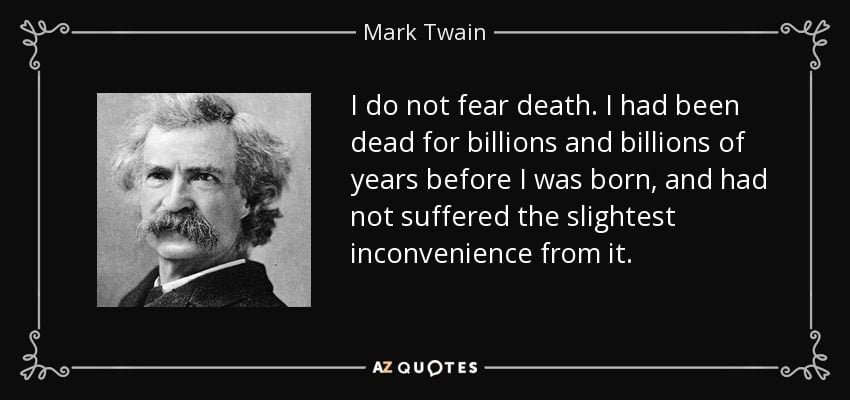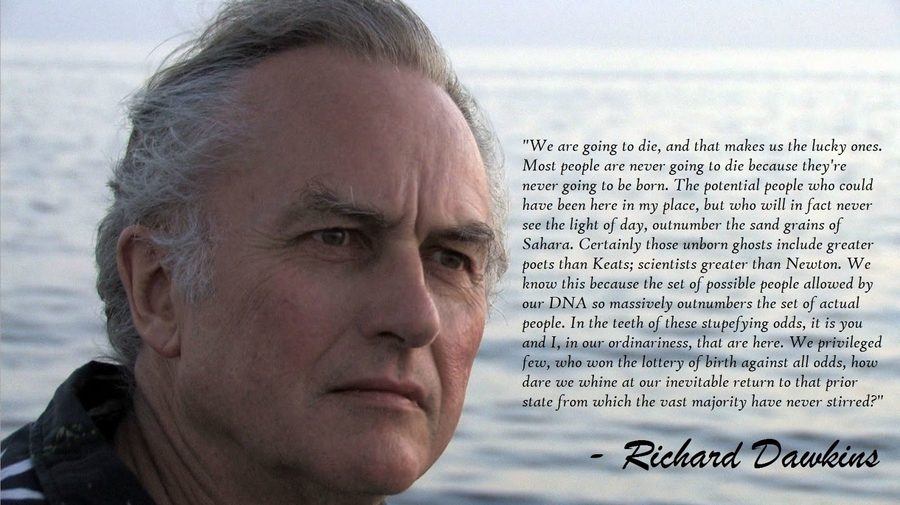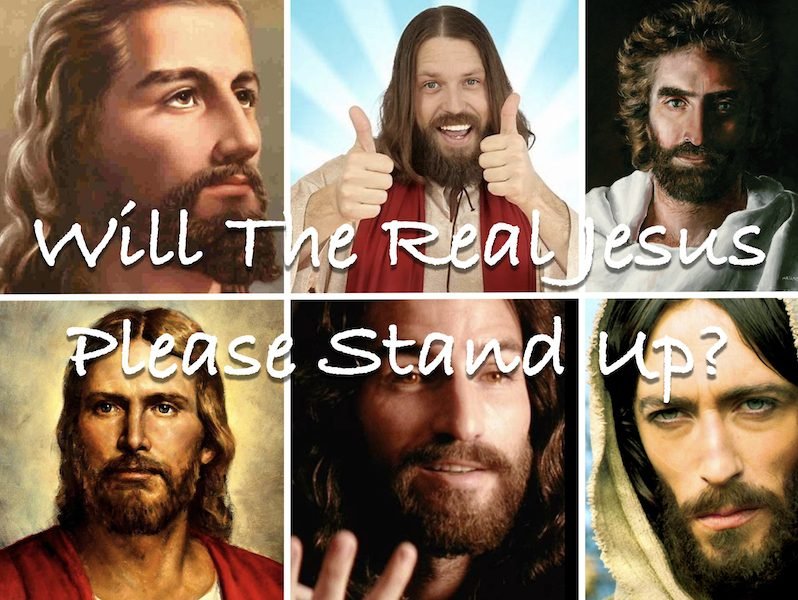
Recently, Evangelical writer Erik Manning interviewed Clay Jones, author of the book Immortal: How the Fear of Death Drives Us and What We Can Do About It. Jones, also an Evangelical, holds a doctor of ministry from Trinity Evangelical Divinity School and is an associate professor in the Master of Arts in Christian Apologetics at Talbot School of Theology — the seminary wing of Biola University.
Jones had some interesting (and ignorant) things to say to about how unbelievers, particularly atheists, deal with death.
People are horrified by the prospect of their deaths but most of the time they won’t admit it to themselves! But when a woman finds a lump in her breast, or a man has a chest pain, or a person gets a positive back on a blood test, then the fear of death stands in front of them and won’t leave the room. What’s scaring people with COVID-19 is that suddenly the possibility of their death becomes very real and it reveals how much they really do fear death. Christians shouldn’t be surprised that non-Christians fear death because Hebrews 2:14-15 tells us Jesus died for us so “that by his death he might break the power of him who holds the power of death—that is, the devil—and free those who all their lives were held in slavery by their fear of death.” Let me emphasize this: the Bible tells us that “all their lives,” people are “held in slavery by their fear of death.”
….
Because people are terrified by the fact of their deaths (even though for the most part they try to deny it and distract themselves from it), down deep they know they will die and they find ways to transcend the fact that they know they are going to die. Much of human behavior is driven by an attempt to evade death.
….
In the book I go through the atheist attempts to feel good, or at least okay about death: “immortality would be boring” (that’s a big one), “live in the moment,” your individual existence is unreal (hard to believe but this was Einstein’s answer), and so on and on. They all fail and that’s why atheists have a higher suicide rate than those who believe there is a God. Here’s the last sentence of the last page of Duke University philosopher Alex Rosenberg’s book The Atheist’s Guide to Reality: Enjoying Life Without Illusions: “Take a Prozac or your favorite serotonin reuptake inhibitor, and keep taking them till they kick in.” So atheist Rosenberg’s presumably sober advice for dealing with death fears is “Get high!”
….
People are living in denial and distraction (you can’t just deny something, you have to distract yourself from it) and that’s why we pay movie, singing, and sports stars more than we pay almost anyone in society—they do what we need most—they keep our minds occupied so we don’t have to think about our deaths. No one should be surprised that people are depressed, neurotic, and even psychotic because of the fear of death scares them. Of course, people are hooked on drugs, as I just said, Rosenberg’s advice to deal with death is to take drugs. Suicide is a symptom of the fear of death because it allows you to control that which controls you.
Jones’ view can be summed up thusly: non-Christians and atheists fear death, deny its existence, and do everything in their power to avoid it. Christians, on the other hand (see interview for what Jones says about Christians and death), accept the reality of death, are prepared to die, and live accordingly. While Jones admits some Christians fear death, he asserts that they do so because they have a “paltry, usually false view of heaven.” Jones adds, that another reason Christians fear death is that “it is so easy for Christian to be in love for this present world.”
Jones’s advice for Christians who fear death is that believers should “focus on eternal life” and remember that Christians “are never going to experience death.” Jones reminds believers:
In Jesus, we will live forever! That’s the Christian’s hope and the evidence for that is that Jesus was raised from the dead. So be encouraged, Christian, you are going to live forever!
I was part of the Christian church for fifty years. I pastored Evangelical churches for twenty-five of those years. I pastored Independent Fundamentalist Baptist (IFB), Southern Baptist, Sovereign Grace Baptist, Christian Union, and nondenominational congregations. I visited numerous dying congregants in the hospital and in their homes. I also did the same for unbelievers, hoping to evangelize them before they died. I have witnessed death up close, standing by bedsides as Christians and unbelievers alike drew their last breaths. These experiences had a powerful effect on me. Having lost my parents at ages forty-nine and fifty-four, I know the pain that one feels when loved ones die. Fifteen years ago, my wife’s sister was tragically killed in a motorcycle accident. We still, to this day, mourn the loss of Kathy. (Please see If One Soul Gets Saved, It’s Worth it All.)
What helped me, at the time, to minister to those who were dying and allowed me to personally endure the death of family members was the fact that I was a Christian; that I believed after death believers were “absent from the body and present with the Lord (2 Corinthians 5:6-8).
When it comes to questions of life and death and whether there is human existence beyond the grave, religion is a panacea. People want to believe their lives have meaning and purpose, and that after death there awaits for them heavenly bliss and reunion with family and friends who, along with Toto, have gone to the great OZ in the sky.
Jones, as Evangelical apologists are wont to do, presupposes that his God, his belief system, and what the Bible says about life, death, and the afterlife are true. For those of us who reject his presuppositions, Jones says we are living in denial. In fact, it is Jones and other Evangelicals like him who are living in denial. The facts on the ground tell us that we live once, die, end of story. Jones provides no evidence for the existence of the afterlife except for what the Bible says about the death and resurrection of Jesus. THE BIBLE SAYS is all Jones has to offer on the subject. If and when Jones coughs up some actual evidence for his claims, I know more than a few atheists who will be glad to listen. Appealing to the Bible is not evidence. And until such evidence is provided, all Jones really has is faith: faith that the triune Christian God is the one true God, faith that the Bible is the inspired, inerrant, infallible Word of God, faith that everything the Bible says about life, death, and eternal life is true. I, for one, am not willing to set reason and skepticism aside and just faith-it.
That said, I recognize the power of the Christian myth. A religion need not be true for it to have value. Jones’ religion is a myth just like all the other religions he has deemed false. The battle between the various religions of the world is all about whose myth is true. Each warring party is certain that their mythology is true. Most people believe that their respective religion is the one true faith. In the United States, Christianity is the dominant myth. Evangelicals such as Jones say that all humans are vile, depraved sinners who deserve judgment and Hell. What an awful view of humanity. Of course, Evangelicals offer a remedy for human depravity: the death and resurrection of Jesus, the son of God. All sinners need to do is repent of their sin and put their faith and trust in Jesus Christ. Well, that and commit oneself to extravagantly worshiping the Christian God, attending (the right) church, reading the Bible, praying, tithing, and living according to the moral code taught in the Bible (as interpreted by Evangelical pastors). True Christians® will do all of these things, and if they do, they will be rewarded with eternal life in the sweet-by-and-by after death.
Millions and millions of Americans believe these things to be true. They are literally betting their lives on the hope and promise of a divine payoff after death. Atheism, of course, can’t compete with the power of the Christian mMillions and millions of Americans believe these things to be true. They are literally betting their lives on the hope and promise of a divine payoff after death. Atheism, of course, can’t compete with the power of the Christian myth. People want or need to believe that their lives have more meaning than the present. Atheists, on the other hand, can only say we have, to misquote a worn-out Evangelical cliché, one life, twill soon be past, and after that we are dead. I know, I know, cold and indifferent, but that’s the nature of reality.
Do all atheists, as Jones ignorantly asserts, fear death? I can’t speak for all atheists, but I can say, personally, that most of the time I don’t fear death. Polly and I were talking about this very thing today. Neither of us is in great health. I have pervasive health problems, and if I become infected with COVID-19, there’s a good chance that I will die. There’s also a good chance that I will die from a heart attack, complications of diabetes, or cancer. And there’s even a better chance that I will trip over a toy left on the floor by one of my grandchildren, fall, and die from a brain contusion or broken neck. The things that could kill me sometime beyond my next breath are legion. Shall I sit around and stew in my mortality? Of course not. All I can do is take care of myself the best I can. Some day, sooner and not later, that won’t be enough, and I will be dead. That’s just how it is. Why should I fear that which I cannot control?
I would argue that it is actually Evangelicals, who deep down in their little old heart of hearts, fear death. Why? Because they will live their whole lives hoping they have believed the right things and done the right things necessary to secure their rooms in God’s Trump Hotel in the Sky. (Please see Evangelicals Talk a Good Line When it Comes to Death, but Change Their Tune When They Are Dying.)
How can they know for sure? Doesn’t the Bible say that many “believers” will be deceived and end up in Hell; that Jesus will say them on judgment day, I never knew you (Matthew 7:22-23)? Isn’t that what critics say of me; that I was a fraud, a false prophet, a deceiver; that I never was a True Christian®; that I never was saved, born-again, bought by the blood, or regenerated? Most Evangelicals are either Calvinists or Arminians. The former believe that a Christian must endure (persevere) unto the end to be saved. No Calvinists can know for sure they are among the elect. And Arminians are not much different, belief-wise. Christians can fall from grace, Arminians say, and entrance into God’s eternal kingdom depends on personal holiness (without which no man shall see the Lord Hebrew 12:14, Romans 6:22, Ephesians 4:24). It should not be surprising, then, that many Evangelicals fear death, wondering if they have done all that is necessary to enter Heaven after death (which technically they don’t do until the general resurrection, but I will leave that subject until another day).
It is not unnatural for any of us — Christians, Muslims, Jews, Buddhists, pagans, atheists, agnostics — to fear what we have never experienced. Can I say with certainty that I will have no fear when it comes my time to die? Of course not. I hope that I will enter the darkness of night in the strength of my convictions; that I have run the race set before me (Hebrews 12:1) and now I am ready to die. Until that time comes, all I know to do is keep pressing forward towards the high mark and calling of reason and humanism (Philippians 3:14), living life to its fullest. Whether I die tonight, tomorrow, or ten years from now, it matters not. Each day is a new opportunity for me to love my family and do what I can to make a difference in the lives of others.
Let me conclude this post with answer I give to the question: If you had one piece of advice to give me, what would it be?
You have one life. There is no heaven or hell. There is no afterlife. You have one life, it’s yours, and what you do with it is what matters most. Love and forgive those who matter to you and ignore those who add nothing to your life. Life is too short to spend time trying to make nice with those who will never make nice with you. Determine who are the people in your life that matter and give your time and devotion to them. Live each and every day to its fullest. You never know when death might come calling. Don’t waste time trying to be a jack of all trades, master of none. Find one or two things you like to do and do them well. Too many people spend way too much time doing things they will never be good at.
Here’s the conclusion of the matter. It’s your life and you best get to living it. Some day, sooner than you think, it will be over. Don’t let your dying days be ones of regret over what might have been.
And all the atheists said, Amen!
Bruce Gerencser, 68, lives in rural Northwest Ohio with his wife of 47 years. He and his wife have six grown children and sixteen grandchildren. Bruce pastored Evangelical churches for twenty-five years in Ohio, Texas, and Michigan. Bruce left the ministry in 2005, and in 2008 he left Christianity. Bruce is now a humanist and an atheist.
Your comments are welcome and appreciated. All first-time comments are moderated. Please read the commenting rules before commenting.
You can email Bruce via the Contact Form.










